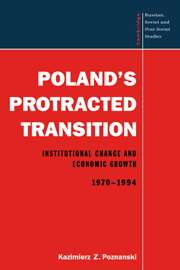Book contents
- Frontmatter
- Contents
- Preface
- Introduction: Research agenda, conceptual model and principal findings
- Part I Imperfect decentralization, broken political contracts and foreign-debt crisis
- 1 Import-led growth policy under ‘soft’ planning
- 2 Impact of technology imports on national economy
- 3 The constraining role of political factors
- Part II Economic reforms, divided society and ‘growth fatigue’
- Part III Communist legacy, ‘shock therapy’ and economic recession
- Appendix
- Notes
- References
- Index
- Titles in the series
3 - The constraining role of political factors
Published online by Cambridge University Press: 29 October 2009
- Frontmatter
- Contents
- Preface
- Introduction: Research agenda, conceptual model and principal findings
- Part I Imperfect decentralization, broken political contracts and foreign-debt crisis
- 1 Import-led growth policy under ‘soft’ planning
- 2 Impact of technology imports on national economy
- 3 The constraining role of political factors
- Part II Economic reforms, divided society and ‘growth fatigue’
- Part III Communist legacy, ‘shock therapy’ and economic recession
- Appendix
- Notes
- References
- Index
- Titles in the series
Summary
Our earlier analysis suggests that control over foreign debt under Gierek's government was strongly limited by other macroeconomic developments, in particular by rapid income increases which were often out of line with productivity. These income increases threatened the external balance because they forced the redirection of on-credit imports to consumption and thus diverting production to domestic users and away from foreign markets. We also suggested that these excessive income increases were due the lax wage/price policy, so that this policy should be viewed as being an important factor behind the onset of the debt crisis and its escalation. If one further follows arguments made before, one can assert that this lax income policy should be attributed to what is there called the ‘softening’ of the state planning machinery, a change which was found to very much define the whole path of the economy in that period.
Whenever fundamental discontinuities occur, such as the above mentioned system's softening, simple, purely economic models fail to offer reliable answers, and political factors have to be looked into. Admitting politics to an economic analysis is particularly desirable when the state-planning order is discussed, because here discretion over economic resources is largely a function of the political resources amassed by actors. So, for such an economic system to change, the political system would have to alter as well, and this did indeed happen in Poland. Economic reforms were by no means a substitute for political changes, but rather occurred simultaneously in a co-evolutionary fashion (in open defiance of the totalitarian model).
- Type
- Chapter
- Information
- Poland's Protracted TransitionInstitutional Change and Economic Growth, 1970–1994, pp. 58 - 80Publisher: Cambridge University PressPrint publication year: 1997



